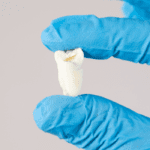Studies have shown that mental health and oral health can interact and impact each other. While more research is needed to understand these connections, patients should be able to recognize the cyclical nature and importance of oral and mental health. They should also work with their doctors to address any concerns.
The Connection Between Oral and Mental Health
Mental health and oral health can directly affect your overall health. Sometimes the dentist is the first to recognize signs and symptoms of mental problems and refer their patients to counselors or therapists.
Dental professionals can tell how your overall health is faring just by looking at your teeth. They are also a good indicator of your mood, stress levels, and anxiety, or if you have an eating disorder.
Mental health and oral health have a wide range of effects on each other. It becomes a difficult cycle to break. Here are some of the ways they affect each other:
Dental Anxiety
One way to demonstrate the link between mental health and oral health is through dental anxiety. Nearly half of the patients who visit the dentist have dental anxiety. Sometimes, it can turn into a dental phobia or other types of fear that prevent them from going to the dentist even though they need treatment.
Not going to the dentist regularly often results in dental problems. Even minor ones that could be caught and treated earlier could worsen and become more challenging to treat. These dental problems may affect a patient’s self-esteem, leading to poor mental health.
Don’t let your dental anxiety stop you from getting the treatment you need. Talk to your dentist about it; they will understand and try to adjust to provide you with the best treatment possible while meeting your needs.
Neglect
People with depression and other mental disorders can feel tired and unmotivated, making it difficult or even impossible to do the most basic tasks, like brushing or flossing their teeth. In time, it can also lead to poor nutrition and more health problems.
Self-esteem
Another way we can see the effects of oral health and mental health on each other is through self-esteem. Patients without regular dental care often feel embarrassed about their smiles, lose the confidence to interact with others, and experience eating and talking difficulties. Bad teeth can sometimes lead to poor self-esteem, which may also worsen a patient’s mental health issues. Soon, these problems lead to more anxiety and increased feelings of isolation, depression, and withdrawal from others.
Coping Mechanisms
Coping mechanisms and oral health are also linked. Patients with mental illnesses often have harmful coping mechanisms like smoking, alcohol, or drugs that can affect their overall well-being, including oral health. Patients with anxiety and depression are also more likely to drink alcohol than others, which can lead to gum disease or oral cancer.
Gut Bacteria
Mental health issues can also impact the bacteria in our digestive systems. Studies show that mild stress can negatively impact gut health and make us more susceptible to infections and diseases. Poor gut health can lead to inflammation and leaking in the intestinal lining, worsening oral conditions such as periodontal disease or tooth disease.
Medications
Some medications used to treat mental illnesses can cause dry mouth, which leads to insufficient amounts of saliva in your mouth to protect your teeth from oral problems. Other medications cause stomatitis, a condition where the lining of the mouth becomes swollen and red.
Mental Illnesses and Oral Health Problems
Some dental issues are linked to different mental illnesses.
Mood Disorders
Patients with depression may lack the motivation or energy to care for their teeth, leading to poor oral hygiene. Tooth wear is one of the first few signs of depression a dentist may notice; patients with depression often smoke, drink, and grind their teeth to cope. They may also have tooth decay.
They may also need to take antidepressants that can cause dry mouth. Poor hygiene and neglecting proper nutrition can also lead to fitting changes of their dental prostheses.
Patients with bipolar affective disorder face additional challenges. They may find it difficult to brush or floss their teeth during manic phases, which can cause abrasions and lacerations to their gums and other soft tissues. Some reports of stomatitis and dry mouth have been associated with lithium treatments for bipolar affective disorder.
Eating Disorders
Tooth erosion is the most common diagnosis for patients with eating disorders. It’s often caused by acidic food and drinks, frequent vomiting, gastric reflux, or other factors. A meta-analysis of 10 studies found that patients with eating disorders are five times more likely than those without to experience tooth erosion. Self-induced vomiting is seven times more likely to cause tooth erosion.
Anorexic patients are more likely than others to display obsessive personality traits. This makes them more careful about hygiene. However, a meta-analysis revealed that patients with anorexia have higher levels of fillings, decay, and missing surfaces due to self-induced vomiting.
Severe Mental Illnesses
Patients with severe mental disorders such as schizophrenia or dementia are more likely to develop gum disease and tooth decay from bacterial infections. Patients with mental disorders like schizophrenia may experience tooth decay and gum disease from their antidepressants, mood stabilizers, and antipsychotics.
Several mental illnesses can increase periodontal risk. An Italian study found that gum disease was the leading cause of death for 99% of psychiatric patients. Untreated, periodontal disease can lead to pockets that extend beyond the tooth.
Tooth loss is the last stage of untreated periodontal diseases and dental caries. A meta-analysis of 25 studies showed that patients with severe mental illness were 2.7% more likely to lose all their teeth than the general public. There was evidence that fluoridated drinking water might have helped reduce the gap between people with mental illness and the public.
How To Keep Up With Your Oral Care
Inadequate oral care can negatively impact your mental health. Here are some tips for managing your oral health and keeping you in a good state of mind:
Maintain healthy gums and teeth.
Mental health and oral hygiene go hand-in-hand. Healthy teeth and gums won’t make anyone feel embarrassed or give them a boost of confidence. Use fluoride toothpaste twice daily to brush your teeth. You should also use interdental floss or brushes at least once daily to clean your teeth thoroughly. It could also help if you reduced your consumption of sugary drinks, food, and alcohol and quit smoking.
Try xylitol mints.
If your medication causes dryness in the mouth, you can try xylitol mints. Xylitol is a natural sweetener, and chewing xylitol mints help increase saliva production and prevent cavities.
Key Takeaway
Mental health and oral health are connected; whatever benefits one benefits the other. And when one of them doesn’t receive the care they need, the other suffers too. One way we can see this is through the different ways mental health can affect oral health, like dental anxiety, which can prevent you from getting the necessary treatments. We can also see this through certain dental problems exhibited by patients with an eating disorder or mood disorder.
Taking care of mental and oral health will help prevent both from worsening and will help you keep your mind and body well.
Live better with Advanced Dental Group.
Keep your oral health and mental health in top shape. Our affiliate dentists in Dillon CO, can help you care for your teeth better. They also perform cosmetic dentistry services that will boost your confidence. Contact us today, and we’ll connect them to you right away.





